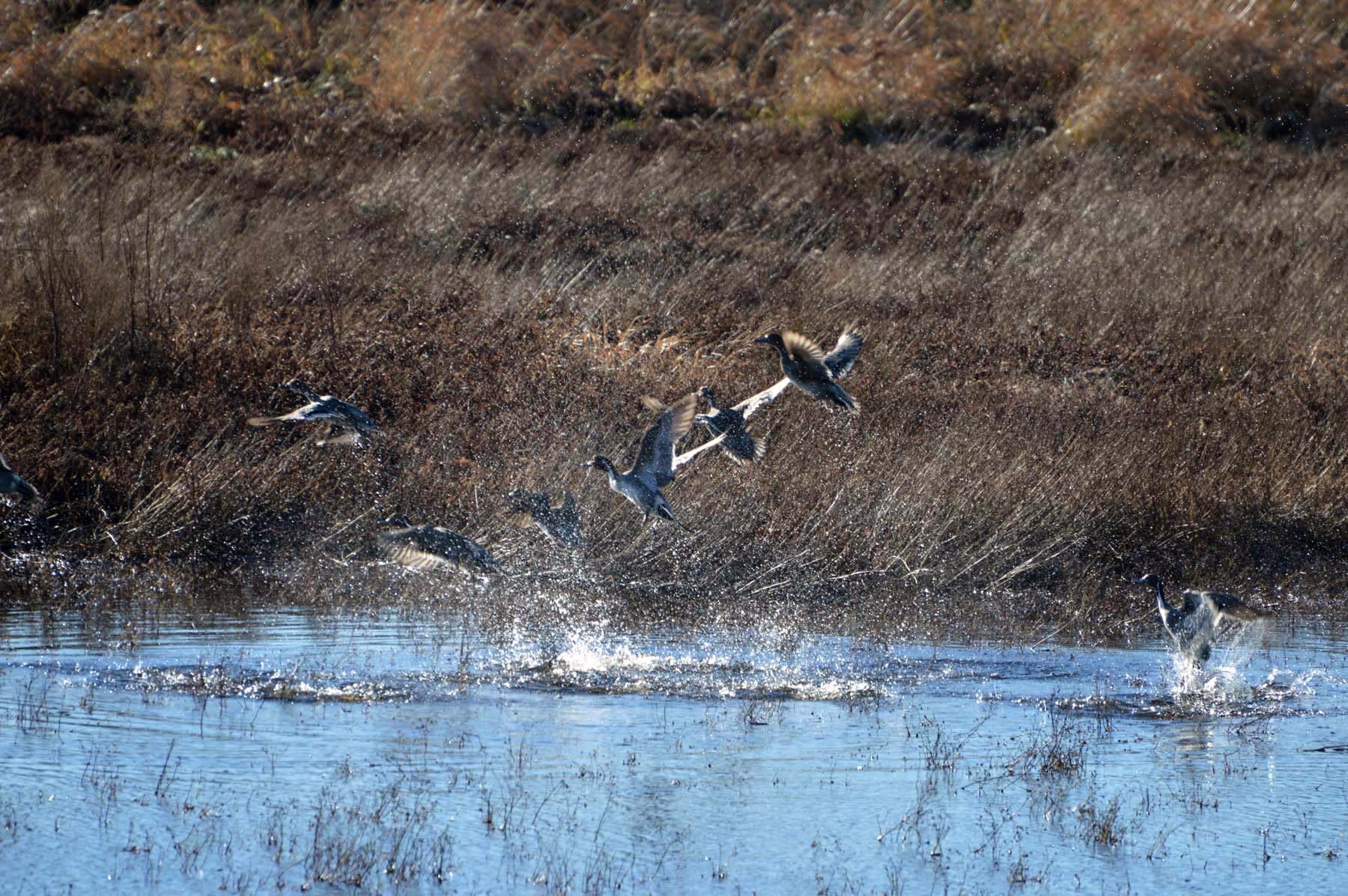Walk with me, but bring the gloves, on a brilliantly sunny and cold day at the wetlands. Puddles covered with ice, ponds slightly frozen, fallen leaves coated with sparkling crystals putting to shame any jewelry store – display.



My avian friends are warming up in the sun. For every heron at rest, there is an egret flying to the next perch, surveying their realm.




The sky occasionally fills with geese spooked by some raptor, and I wish I could add the sound here of them chattering and honking, a spectacular chorus. Eventually they come to rest, returning to snoozing.


I, on the other hand, have not been snoozing this week, driven by a sentiment probably shared by many of you: What can we do? I have been reading quite a bit, soaking up good advice from trusted sources, and making use of many helpful sites that display what we need to know in straightforward and legible ways.
Much of the advice overlaps: inform yourself, pace yourself, don’t give up in advance, protect the most vulnerable, engage, build and cherish community from the ground up. Two things I found particularly helpful:
- Ask yourself what your strengths are: not all of us are able or willing to do public work, or join committees, or have the resources to support causes financially, or get engaged in elective office. We all have something to contribute, however. If you like baking, organize bake sales. Agreed, chocolate chip cookies are not going to defeat fascism, but a community nourished by seeing members contribute in whatever ways they can, will be more resistent and more effective in coming together and taking the necessary steps.
- Focus on your interest. You cannot fight on every front. Pick the arenas where you have the most expertise or the most passion, and join efforts there.
In my case, I have a platform with this blog where I can summarize both relevant sources and write about my interpretations of them. I can do much of the reading you don’t have time for, and pick the best pieces with a critical eye on informational value, not necessarily ideology. I am also deeply interested in science and climate crisis, so that is where I will be particularly involved. Note, though, it really is up to everyone – if you are interested in protecting immigrants, DEI-or women’s rights, or fight against racism, Islamophobia, anti-Semitism or newly established prison camps, it matters. There is no hierarchy of what needs to be protected- there is much under attack and requires advocates.

Here are Robert Reich, Dave Troy, and Timothy Snyder with pragmatic advice lists. And here is a helpful conversation between Jen Rubin and Heather Cox Richardson.
Here is a nifty google drive action tracker listing all the Executive Orders and memos proclaimed so far, grouped by targets. That allows you to inform yourself about your area of interest and what is currently affecting the status quo.
***
Given one of my interests, science, here is another bit of news (in more detail in Paul Krugman’s assessment today):
As of now there is a new communications ban from HHS. The gag order includes the publication of scientific information, including reports that are already done, prohibits emergency alerts for pandemic information, or rising health risks, including weekly data on respiratory disease developments.
Meetings and report releases for the National Vaccine Advisory Committee and the Presidential Advisory Council for Combating Antibiotic Resistance are canceled. HHS is searching for DEIA programs and threatening anyone who disguises them. They are asking for people to report colleagues.
NIH study sections are canceled/postponed. These are the sections that approve grant proposals and provide funding for institutional research. This affects more than 300.000 researchers and 2500 institutions. All travel is suspended and conference publications must be approved in advance by a presidential appointee. That affects nearly $50 billion of scientific research.
Pausing public health communications and research means delays in responding to emerging threats, like H5N1. But these measures also have an economic impact. Public health protects more than health—it safeguards our economy. Disruptions in systems can ripple across industries, as we’ve already seen with avian flu and egg prices.
Note that every $1 spent by NIH generates $2.46. For example, in 2023, $47B in NIH spending generated ~$93B. Halting it all will cost us money, create worse health outcome and might motivate all the scientific talent that is now losing their grant funded jobs to go elsewhere. As of now, it is all gone, with health and education directly implicated.

If you click this link, it offers map and you can tap on your state and find out what is affected by the new administration’s directive towards the National Institute for Health (NIH). Here are the OR and CA impacts, respectively.


Before we are getting too discouraged, here is the long read for the weekend that argues the world isn’t as bad as you think. I agree with much of it, but also want to point out that it is psychologically much harder to relinquish a right or protective matter that you already held or is available to you, than experiencing improvements of a state of need. If we know we can protect our children with vaccines or health risk alerts and they are subsequently blocked by political maniacs, it is a huge blow, individually for all the little ones I love and societally for what the future will hold.

Music today dates me since I still saw it live – album by The Band. RIP Garth Hudson, who died this week.




















